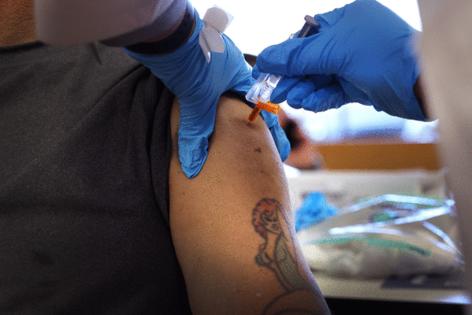Vaccine Integrity Project seeks to counter federal inaction, misinformation
Published in News & Features
The Minnesota-based Vaccine Integrity Project followed through Tuesday on a promise to provide scientific data on vaccine safety and effectiveness ― even though it contradicts President Donald Trump’s federal health advisers.
The project collected results from 590 existing studies and pooled them to see what they collectively show about the latest vaccines against COVID-19, influenza and the respiratory virus RSV. Twenty-four doctors reviewed the results and generally found vaccines continued to protect three key populations: children, pregnant women and people with diminished immune systems.
“The new data does not indicate the emergence of a signal (indicating safety concerns) or sudden drop of effectiveness” in the vaccines, said Michael Osterholm, director of the University of Minnesota’s Center for Infectious Disease Research and Policy. The center houses the new Vaccine Integrity Project, which is privately funded by the iAlumbra foundation.
The analysis released on Tuesday mimicked the research reviews routinely provided in the past by the Centers for Disease Control and Prevention, Osterholm said. Instead, he said the information coming from federal health sources ahead of the oncoming respiratory virus season is “flawed, analytically fraught, or flat-out wrong.”
For example, he said there is no credible scientific evidence to support this summer’s federal Health and Human Services (HHS) decision to soften COVID-19 vaccine guidance for pregnant women and children at risk of severe illness or transmitting the infection to others at high risk of complications.
“The government agencies that we have previously counted on to provide us with the factual-based information to support recommendations are going to be at odds with us,” Osterholm said. “We have to do whatever we can to eliminate the politics of this. It shouldn’t be partisan. Stick with the facts.”
The project’s goal wasn’t to offer vaccine recommendations, but rather to make a massive amount of vaccine data understandable for others.
“The goal of it really was to assemble the information, synthesize it, so that we can then pass it off to the individual professional societies that will make recommendations,” said Dr. Michael Abers, a Philadelphia physician who helped to present the group’s findings Tuesday.
The American Academy of Pediatrics, or AAP, coincidentally issued its vaccine recommendations on Tuesday. The organization recommended children aged 6 months to 23 months should receive COVID-19 vaccines unless they have allergies to its ingredients. Older children should also receive it if they’re at elevated risk of transmitting the virus to others at high risk of COVID-related complications.
That breaks with the CDC’s softer recommendation for parents and clinicians to use “shared decision-making” to decide whether children six months and older should be vaccinated.
HHS communications director Andrew Nixon accused AAP of “undermining national immunization policymaking” by making recommendations that differed with federal guidance. He added in his written statement that HHS Secretary Robert F. Kennedy Jr. “has stood firm in his commitment to science, transparency, and restoring public trust.”
The integrity project also plans to synthesize data on vaccine safety and effectiveness for older adults at elevated risk for infection-related hospitalizations and deaths, and for the general population. The project also is creating a searchable website so people can look up vaccine safety and effectiveness for different demographic groups.
The focused analysis of studies published over the last year limited the conclusions. The researchers found plenty of evidence supporting the strong effectiveness of the nirsevimab vaccine in preventing RSV-related hospitalizations and medical complications in children. But none of the most recent studies offered safety or effectiveness results for clesrovimab, an antibody therapy also federally recommended to reduce the risk of RSV.
The analysis agreed with prior studies in finding a risk of myocarditis, or an inflammation of the heart muscle, in children who received COVID-19 vaccines. Dr. Harleen Marwah, a pediatrician at Massachusetts General Brigham for Children, presented the results and said the risk appeared greatest when children received second doses but diminished with subsequent doses. One study included in the analysis found up to three cases per 100,000 recipients, mostly males, of the Pfizer version of the COVID vaccine.
“Most appear to be mild cases,” she added.
Four health care experts, including the editor in chief of the New England Journal of Medicine, reviewed Tuesday’s data for the first time and challenged the presenters on the results. Dr. Oliver Brooks of the Charles R. Drew School of Medicine and Science in Los Angeles said the observations on the myocarditis risk were limited because they did not compare the equivalent risk of the complication from COVID itself.
Katelyn Jetelina, CEO and founder of Your Local Epidemiologist, said she was “blown away” by the latest data showing how strongly vaccines protect children from RSV.
The researchers found at least one study showing a concern about preterm birth in pregnant women who received the RSV vaccine. Osterholm said further research on that potential complication is ongoing. Another study included in their analysis suggested influenza vaccines offered a potential protective effect against preterm birth.
Osterholm said the project went to great lengths to scrutinize bias in the studies it included, and among the experts selected for the analysis.
“Americans will also have the peace of mind,” he said, “that experts assembled by the Vaccine Integrity Project have independently analyzed information they need (to use) to decide how best to protect themselves and their families.”
_____
©2025 The Minnesota Star Tribune. Visit startribune.com. Distributed by Tribune Content Agency, LLC







Comments